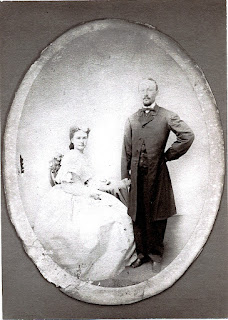I have known for some time that my 2X-great-grandfather, Andrew Jackson Gwynn, served in the Confederate army during the Civil War, but I had not filled in the details of his service, so I am taking the opportunity to do that now.
Andrew Jackson Gwynn, the son of John Hilleary Gwynn and Ann Eliza Dyer, was born in Piscataway, Prince George's County MD, 24 November 1836, the youngest of their eight children. The family property was known as Pleasant Springs. According to AJ's daughter, Effie Gwynn Bowie, it was a large two-story and attic house with piazza's latticed at the ends and covered with running roses. John Hilleary Gwynn was a slaveholder; the 1850 Census shows 18 enslaved people on his property.
When John Hilleary Gwynn died in 1857, he left the Pleasant Springs house to his son Andrew, with the proviso that his two widowed daughters, Margaret Emily Edelen and Susan Heiskell, as well as his single daughter, Ann Eliza Gwynn, should continue to live at the family home.
The map below shows the Piscataway area about 1861. Several Gwynn properties are identified as well as the local Catholic Church. The Gwynns were devout Catholics and John H. left money in his will for a pew at St. Mary's in Piscataway.
In the 1860 Census, Andrew, age 25, has his sister Susan, his nephew Willie Heiskell, and his sister Ann in his household. Unfortunately, Andrew did not long enjoy the Pleasant Springs home. Shortly after this census, Pleasant Springs burned down, supposedly set on fire by a disgruntled servant who had been bribed by a Union officer to do it. (This according to Effie Gwynn Bowie, that fount of family history and gossip.) Aunt Effie tells us that a Confederate spy had been found in the house, but escaped the Union soldiers, who, in turn, burned down the house in revenge using that servant, who supposedly confessed to the crime on her deathbed.
In any case, the house was destroyed by fire about 1862. Susan Gwynn Heiskell built a small house on the estate and lived there until her death. Ann Eliza Gwynn entered the Sisters of Mercy convent in Baltimore, becoming Sister Mary Augusta. Margaret Gwynn Edelen moved to Baltimore where she lived with her widowed sister Celestia Gwynn Belt. I have told their stories elsewhere.
So, with his inheritance pretty much destroyed, AJ decided to join the Confederate Army. Maryland being officially a Union state, he headed for Richmond VA where he enlisted as a private in the 2nd Maryland Infantry on August 26, 1862. (Even though they were in Virginia, the members of this battalion were Marylanders.) By October 1862, he had been promoted to Captain.I have no letters or diaries or other documents from Grandfather Gwynn that explain his feelings about the war or his decision to fight for the Confederacy. Certainly, many other Maryland young men took the same path, including my 2X-great-grandfather, John Marshall Dent. But I have to think that if the story of the Pleasant Springs fire is true, that may have influenced his decision along with any other factors.
The 2nd Maryland Infantry was assigned to General George Hume Steuart, and spent the winter of 1862-63 in the Shenandoah Valley of Virginia, without seeing much action. Few of the men were equipped with tents and according to Captain Goldsborough, who chronicled the history of this battalion, "it was no unusual thing to see several hundred men arise from a covering of a foot of snow that had fallen during the night."
In the summer of 1863, the battalion was joined up to General Richard Ewell's 2nd Corps of the Army of Northern Virginia and began to advance into Maryland. The Marylanders were apparently jubilant to be returning to their home soil. General Steuart is said to have jumped down from his horse, kissed the ground and began whistling Maryland, My Maryland.
"We loved Maryland, we felt that she was in bondage against her will, and we burned with desire to have a part in liberating her."--General Steuart
In June 1863, 2nd MD fought fairly successfully at Winchester VA before heading north to Gettysburg PA, arriving late in the afternoon of July 1. They took a position at the far edge of the Confederate left at the foot of Culp's Hill, exhausted after a 130-mile forced march.
On July 2, the Confederate troops attacked the hill and were able to hold the lower part until the next day, when they saw the full strength of the Union position. Union artillery cut down the Confederate troops in an area referred to as "the slaughter pen," the casualties being so severe that General Steuart is said to have broken down and wept at the losses. Steuart's brigade lost between a half and two thirds of its men. Andrew Jackson Gwynn was wounded in this battle, a bayonet wound through the thigh, and carried the physical scars for the rest of his life.
After the War, AJ Gwynn married Marie Louise Keene, the daughter of Benjamin Gaither Keene of Dorchester County MD. They were married at the Basilica of the Assumption in Baltimore MD on January 8, 1868. I believe the picture at the right is their wedding picture.

.jpg)





No comments:
Post a Comment